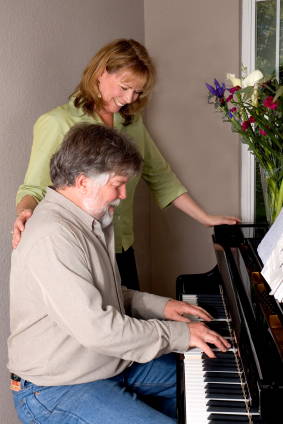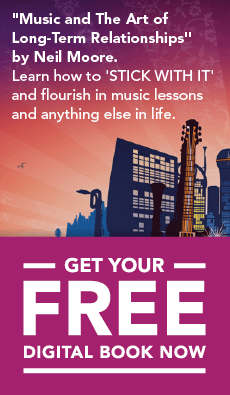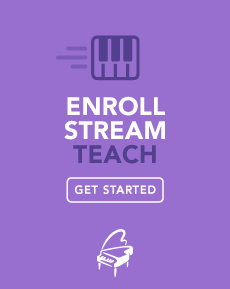
Your Simply Music teacher will tell you that the real learning occurs more at home than in the lesson. As Neil Moore puts it, coming to a lesson is like a chef going to the market to buy his ingredients – of course that’s necessary, but the real work happens back in the kitchen. I’ve often wished I was a fly on the wall around a student’s piano (this is about where the kitchen analogy breaks down) just to know how they are using that time. I often “mock” exactly how I want a student to work on something through the week, but in the end, the time at the coal face is theirs and theirs alone.
Still, that won’t stop me making these suggestions, knowing that good use of practice time can be enough to make or break our ongoing relationship with music.
1. Find your best practice time
You’ll get the most from your practice when you’re feeling your best – when you are relaxed but not tired, alert but not stressed. For you, it might be at the beginning of the day, or perhaps after a snack post-school or work, or maybe later when the kids have gone to bed. Certainly it should be when distractions – noise, conversations, other commitments – are at a minimum. Whatever you find works for you, it makes a huge difference if it is, as much as possible, the same time each day. The more your practice is a part of your daily routine, the less likely you are not to do it – you eat, you sleep, you brush your teeth, you play piano, you just do it. Try to see it as ‘personal time’ – part of the routine that gets you charged up for the day, or helps you wind down at its end.
That doesn’t mean practice won’t sometimes occur as a drag. Practice is a mirror of the whole long-term relationship with music, which, as your teacher has no doubt repeated ad nauseam, will always be a journey through Peaks, Valleys and Plateaus.
2. Create the best practice environment
Sometimes I shudder when I hear where my students keep their instrument and the distractions caused in both directions by that (What’s worse: someone playing Xbox while you’re at the piano or someone at the piano while you’re playing Xbox?). The ideal practice space is dedicated – quiet and exclusive – a “sacred space”.
If that ideal is beyond your circumstances, at least make it a nice place to be – tidy, clean and comfortable. Perhaps claim it as your space by decorating it with something that has meaning for you.
Be organised – have a device to watch the videos and read the notes close to the piano. Have your Playlist and Note books open during each session.
3. Pay attention
I have been using a computer keyboard for more than 20 years, but I’m still a rubbish typist! Repetition, though necessary, does not on its own make you much better at something. Be conscious and thoughtful as you practice; don’t just go through the motions. If you find yourself feeling distracted, stop and reboot.
Make practice not just about improving your musicianship – make it about improving yourself. Practice is itself a skill to be learned. Try to always be thinking, “is there a better way I can do this task?”. Be creative with your approach. As you’re consolidating your playing, you can sharpen your attention by giving yourself specific challenges. For example, play along with the student audio track, focusing on how accurate you can make your rhythm.
If all this concentrating is getting tiring, take a break. Often several short sessions are better than one long one. That said, you may not have to stop your practice session entirely. It may be enough to move on to a different practice task, returning to the first one later in the session.
Music is a gift we can all enjoy at whatever level we’re at. Practice keeps us moving forward, but it shouldn’t stop us from just having fun.
4. Know what’s needed
It’s good to identify the multiple stages of learning something. In Simply Music, we distinguish between “what to do” and “how to do it”. “What to Do” is about the nuts and bolts, understanding the specifics of fingering, identifying patterns and so on. In Simply Music, this is usually made very clear by both your teacher and the Student Home Materials; how a song is broken down into manageable tasks is clearly explained. Use these materials! They are not just a backup – not only are they essential for knowing the specifics of the task, they are crucial to building the box of learning tools that you can count on when the tasks get tougher.
Still, it’s not always easy to know how much time you need to spend on “What to Do” before moving on to “How to Do It” – the details of tempo, evenness, expression and so on. Simply Music Teacher and technique guru Nancy Reese uses a “Three Times in a Row” rule – when you can do the task correctly three times in a row, you are ready to move on. This also helps you know if you are taking on the right size of task – if you can’t manage to do it three times in a row within a reasonable length of time, you are either trying to do too much or trying to do it too fast. Choose a smaller task, or just slow down!
However, don’t take this separation of What to Do and How to Do It as meaning you shouldn’t consider the bigger picture from the beginning. Even while you’re working out the fundamentals, you can be thinking about how you want the song to sound. And considering that every task will likely be short and simple, playing it expressively can come early on, emerging naturally in its unfolding.
5. Start slowly
A Texas University study found that the single biggest key to reliably learning a passage of music is processing it slowly enough that you minimise mistakes. Going through something a few times slowly enough that you can confirm you’re doing it right is much more effective than repeating more times with mistakes. Every mistake is a little bit of learning that you will then have to unlearn. This applies both to What To Do and How to Do It, although once you get to How to Do it, you can also spend some of the time challenging yourself in a different way by playing at full speed without stopping. This has the benefit of helping you learn not be thrown by mistakes. The difference between an amateur and a professional is not that the pro never makes mistakes; it’s more that the pro just keeps playing (and smiling).
Of course, as you play through your piece, you’ll be listening carefully to yourself to identify the weak spots, remembering them and then going back to them to iron out the wrinkles – yes, back to What to Do, slow processing, Three Times in a Row and all that stuff.
6. Set goals
Goals help keep the end in sight and give you a yardstick. They can be long-term (“I’m going to be able to play Für Elise for my Aunt on Christmas day”) and short term (“I’m going to have the LH confident in Alma Mater Blues before I begin the RH”). Make them achievable enough that you won’t too often be disappointed, but not so achievable that you’ll win every time. That way you’ll stay on your toes.
I find it really helps to have goals that involve other people. Nothing sharpens your faculties like preparing something for playing with, or for, other people. It’s especially great to find opportunities to work with people who are more skilled than you.
Write your goals down, including specific timelines and progress markers, and revisit them regularly. Better still, create a task list for each practice session with your goals in mind. Estimate how much time might you need to complete each task, and, if necessary, time yourself as you go.
7. Know what to work on
Always be aware and proud of what you can do, but don’t spend more time than necessary on it. Be honest about what you can’t do and focus your efforts on that. But while you’re being honest, be kind to yourself. Everyone has failings – the successful people are the ones who actually look at those failings with detachment and simply go about addressing them.
To make sure you’re making the best use of your time, keep a well-maintained Playlist and have it in front of you as you practice. Check off each song as you play it, rather than all at once at the end of the session. Being time-efficient will be especially important as your Playlist grows. Simply Music Teacher Mark S. Meritt has developed a nifty system he calls Play it Forward to make sure you’re maintaining your Playlist in excellent health while avoiding playing each piece more than necessary.
Be open-minded about what’s needed to best work on a project. You’ll notice that Simply Music projects don’t always start at the beginning of the piece. In the same way, as you’re playing through a piece, don’t just start at the beginning every time. In fact, to make sure you haven’t mindlessly drilled it in, deliberately play from different points.
8. Listen to your Teacher and Life Coach
 You or your parents pay good money to your teacher. Why? Because they know what’s best for your musical development. They’ve trained in a method that they know delivers results. If you think you know a better way to work on something, don’t just do it your way, discuss it with your teacher. The same goes for your Life Coach – the parent or carer who comes with you to lessons and supervises your practice time. They and the teacher are there to maximise your chances of the best outcome. Listening closely to their advice will avoid a lot of dead ends on your musical journey.
You or your parents pay good money to your teacher. Why? Because they know what’s best for your musical development. They’ve trained in a method that they know delivers results. If you think you know a better way to work on something, don’t just do it your way, discuss it with your teacher. The same goes for your Life Coach – the parent or carer who comes with you to lessons and supervises your practice time. They and the teacher are there to maximise your chances of the best outcome. Listening closely to their advice will avoid a lot of dead ends on your musical journey.
Share with them. Make sure you tell them if you’re struggling with something, or if you’re especially pleased with something. Your teacher should regularly check in with you where you are at any moment – peak, valley, plateau, brief, sustained, prolonged – and you should take the opportunity to say where you really feel you are (rather than what you think your teacher wants to hear) to get the maximum benefit from her coaching.
9. Be detached
I can promise you one thing – those peaks, valleys and plateaus will always be with you. You won’t always achieve your goals, you won’t always feel like you’re making headway and you won’t always find practice fun. If that wasn’t true, something would be wrong! But you’ll maintain a healthy perspective if you are prepared for the occasional struggle. When that happens, remind yourself it’s not you, it’s just a normal part of any worthwhile endeavour.
Also regularly remind yourself why you’re doing this – hopefully because you love music and being self-expressed – and remind yourself that there are rewards along the way. If there weren’t, we’d all be in trouble, because when it comes to music, you never “arrive” – it’s a permanent journey.
10. Give yourself free play time, too
If it doesn’t sound like I’m contradicting something I’ve already said, make sure you give yourself time to do what you love without specific expectations. Just play – play your Playlist songs to keep them alive, but also just give yourself time to explore – improvise, work things out by ear, go through a book of your favourite accompaniment songs, jam with friends. Music is a gift we can all enjoy at whatever level we’re at. Practice keeps us moving forward, but it shouldn’t stop us from just having fun.









